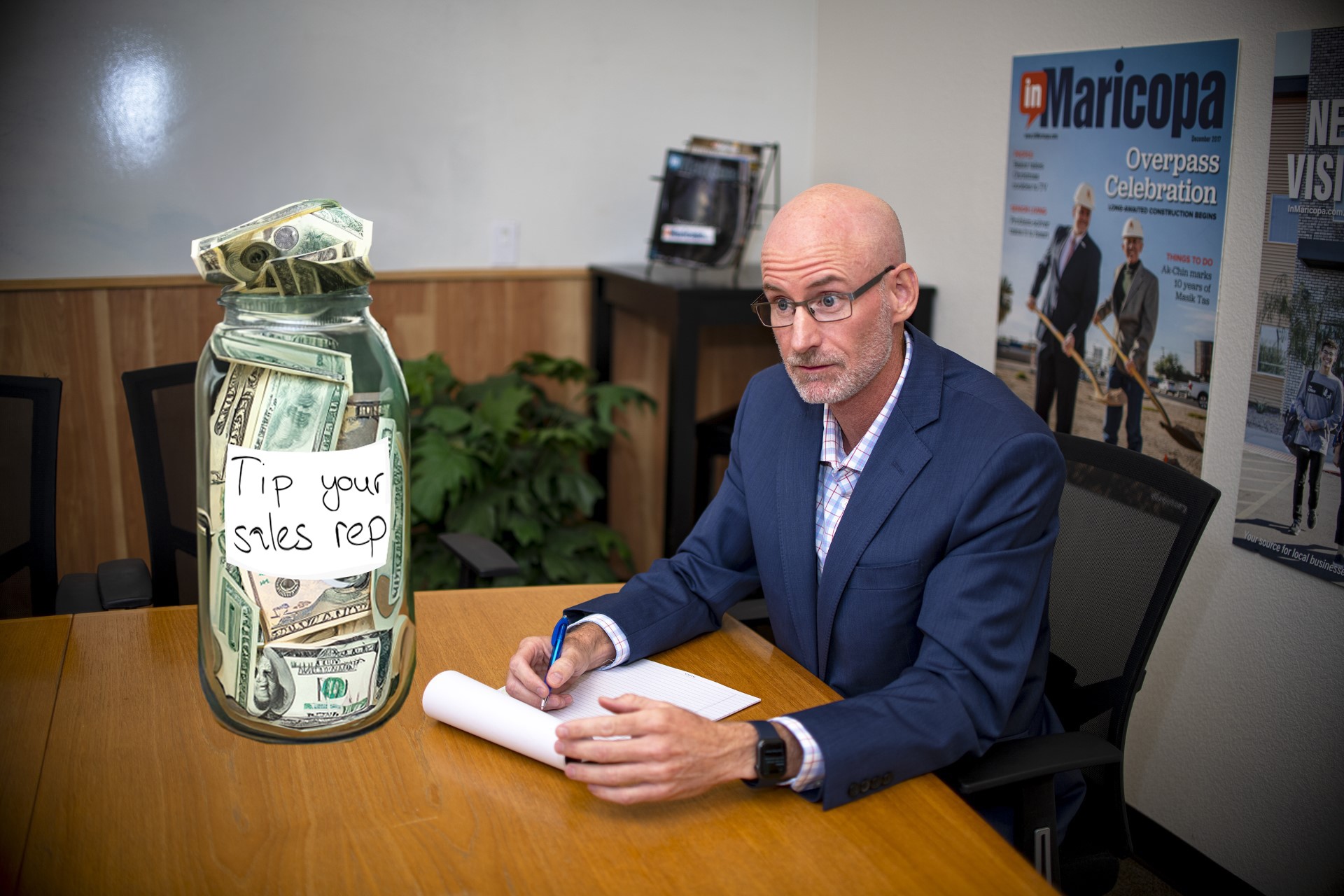Brainwashing: the process of pressuring someone into adopting radically different beliefs by using systematic and often forcible means.
In hindsight, I don’t think it’s dramatic to say the service industry brainwashed me — and maybe you — with its overzealous shift to soliciting handouts without regard to reason.
For decades I tipped the countless service providers — and back then you could put “food” in front of “service” — who made less than minimum wage and relied on gratuities to supplement their income.
I don’t remember my base pay when I was a busboy and waiter, though it was something south of the $3.35 minimum wage, but I remember how meaningful each tip I received was. So, I went through life tipping a normal amount — 15%-plus as a rule — and more when the service warranted.
In recent years, I’ve continued to tip in accordance with societal norms, even as those norms have changed.
I remember going on a touristy mountain bike ride in Bend, Ore. And I remember the guide being a real jerk — arrogant, condescending, impolite. What did I do afterward? I gave him a $20 tip.
More recently, my wife and I went scuba-diving in San Diego. Well, my wife went scuba-diving; I bobbed on top of the Pacific Ocean for an hour because the guide lost track of his divers and would not allow me to descend. What did I do afterward? I gave him a $20 tip.
Am I that insecure? Or that susceptible to brainwashing? Either way, looking back, I am as amazed as I am embarrassed.
Fast-forward to this summer, our first family cruise. I tipped a guy on Royal Caribbean’s Voyager of the Seas for letting me borrow a corkscrew for 30 seconds. Why? Intellectually, it seems obvious such a service would be included in the whopping $90 per day ($18 per person) I was already paying in mandatory gratuities. (Isn’t this an oxymoron?) Yet, the sense of obligation crept over me nonetheless.
On the flip side, despite feeling gouged by the mandatory gratuity charges, I generously tipped our room attendants and waiter and felt good about it because (a) they enhanced our experience, (b) I knew their names and they knew mine, (c) they rely on tips to make their living and (d) I was confident their young families in Indonesia (or so the stories went) would put it to good use.
The U.S. has always been the global outlier in the gratuity world. But we’ve really taken it to a new level in recent years.
It seems to me to coincide with the advent of Square and Toast. The uber-cool, point-of-sale, credit-card processing tools and their competitors revolutionized the payment process for millions of small businesses. It also seems to have revolutionized their payroll and our tipping philosophies.
It was cute and convenient when the merchant flipped around that little counter terminal or handed you a handheld version for you to stick in your card and pay for services. Back then, I recall “NONE” was a prominent selection on the “optional” gratuity screen. Now, it seems you’re lucky if you can navigate to “OTHER” around the predetermined options the merchant thinks are more appropriate for you, and profitable for them.
And it works. I find myself wondering what is socially acceptable, who is in line behind me looking over my shoulder, why I am arguing with gratuity ghosts over a tip that will likely just further enable our entitled society.
My perspective is as both a customer and business owner. I don’t inherently mind workers accepting tips, despite my issues with the overt solicitation and weaponization of the human psyche thereof. If customers are inclined to voluntarily pay extra for services — whether for legitimate or weak-minded reasons as I’ve done in the past — so be it.
But it has graduated to the point businesses are unnecessarily and arguably unfairly subsidizing their labor costs on the backs of undeserving and oftentimes unsuspecting customers. Moreover, it’s oftentimes the owner of the establishment you are tipping, not some single mom trying to feed her kids.
If you cannot operate, say, a retail business without asking every customer to overpay, maybe your business model is flawed, or the economics otherwise suggest you shouldn’t be in that business.
I am no longer in lockstep with America’s supposed tipping expectations of today; expectations, I might add, that most certainly were created by the beneficiaries of such gratuities, not the benefactors.
I have my dog groomer shop to thank, along with much-delayed wisdom and maturity, for helping change my perspective from blind follower to independent thinker. It’s hard enough coughing up $65 to have someone wash my dog and cut her hair. But I am taking my dog to you and coming back to pick her up. You act like you don’t know my name — even though it’s right there on your schedule — and you certainly don’t care enough to share yours with me. You’re doing what I am paying you to do and absolutely nothing more. And you probably own the shop. Yet, you ask for, and I feel obligated to provide, a tip.
And I am not alone.
During my ongoing transition to a more independent thinker, I found my sister laughing out loud as she placed a pickup order from the Nektar app. “They want to know if I want to add a tip; and I haven’t gotten service yet,” she mused.
No more. Now, I have rules. These rules, spelled out at right, can be summarized in one phrase: Give from your gut, not your guilt.
It ain’t easy givin’ green
Do as I say, not as I’ve done.
Tip nothing
- You are not a human.
- You accepted the job based on the wage offered, not whatever your store’s robotic customer base blindly places in the tip jar or checks on the arguably inappropriate request on the payment screen.
- You are handing me something (I bought) over a counter.
- You have done nothing outside of providing the service I ordered (i.e. doing your job).
- You have offered no pleasantries (No ‘Good morning,’ no ‘Welcome in, we’re happy you chose us,’ no ‘That’s a nice tie,’ no ‘Hi, I’m Janelle’…)
Tip something
- You are working a job known to rely on tips (e.g. waiter).
- You provided me a service I wanted but didn’t need (e.g. bellhop).
- I know your name.
Tip like you mean it
- You know my name.
- You provided exceptional service.
The November edition of InMaricopa Magazine is in Maricopa mailboxes and available online.





![City gave new manager big low-interest home loan City Manager Ben Bitter speaks during a Chamber of Commerce event at Global Water Resources on April 11, 2024. Bitter discussed the current state of economic development in Maricopa, as well as hinting at lowering property tax rates again. [Monica D. Spencer]](https://www.inmaricopa.com/wp-content/uploads/2024/04/spencer-041124-ben-bitter-chamber-property-taxes-web-218x150.jpg)

![3 things to know about the new city budget Vice Mayor Amber Liermann and Councilmember Eric Goettl review parts of the city's 2024 operational budget with Mayor Nancy Smith on April 24, 2024. [Monica D. Spencer]](https://www.inmaricopa.com/wp-content/uploads/2024/04/spencer-042424-preliminary-budget-meeting-web-218x150.jpg)





![Alleged car thief released without charges Phoenix police stop a stolen vehicle on April 20, 2024. [Facebook]](https://www.inmaricopa.com/wp-content/uploads/2024/04/IMG_5040-218x150.jpg)




![City gave new manager big low-interest home loan City Manager Ben Bitter speaks during a Chamber of Commerce event at Global Water Resources on April 11, 2024. Bitter discussed the current state of economic development in Maricopa, as well as hinting at lowering property tax rates again. [Monica D. Spencer]](https://www.inmaricopa.com/wp-content/uploads/2024/04/spencer-041124-ben-bitter-chamber-property-taxes-web-100x70.jpg)